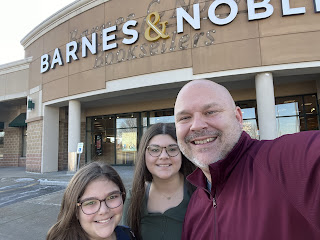My two oldest daughters recently purchased their very first books at an actual bookstore. Yes, we’ve gone to the library and purchased online before, but this was a new experience for them. We don’t have big bookstores where we live and made a point to stop at a Barnes & Noble during a recent trip.
My middle child searched for over an hour and was on the verge of leaving without a book had it not been for a collective, determined effort to help her. My oldest daughter, however, found three books within the first ten minutes upon entering the store.
I asked Ella how she settled on her books so quickly, and she responded that her friends had talked about them. Had it not been for these informal book talks, her experience that day would likely have been similar to her sister’s.
This made me think of the good ol’ days of visiting the local movie store to rent movies. If we had no idea what we wanted to watch, we’d spend a great deal of time roaming the aisles and reading back covers before ultimately deciding on what to (or not to) rent. However, if somebody had told us about a good movie we’d likely go right to it hoping to find an available copy on the shelf.
There is a lesson to be learned here when it comes to fostering a love of reading. Our kids need to experience more book talks at school. We cannot leave this to chance.
How often do teachers have a few spare moments here or there in class? When you consider the frequency in which students may be entertaining themselves on devices at the end of class time, it’s likely more often than we realize. These moments are great opportunities for students and teachers to talk about books and series they’ve read and enjoyed.
If we want to foster a love of reading, we must be intentional with the experiences we facilitate. Book talks are quick, simple, and powerful ways to help do this. They could be done during the first 5 minutes of PE or at the end of class following an Algebra test.
As educators, it’s up to all of us to help foster a love of reading. Our efforts could result in blockbuster impacts on our students.
Below are a few resources I’ve found online for book talk strategies and ideas:
Doug Dunn is currently junior high principal for the Licking (MO) School District. He has previously served as a K-8 superintendent and elementary principal. Doug can be found on Twitter @DougDunnEdS.


